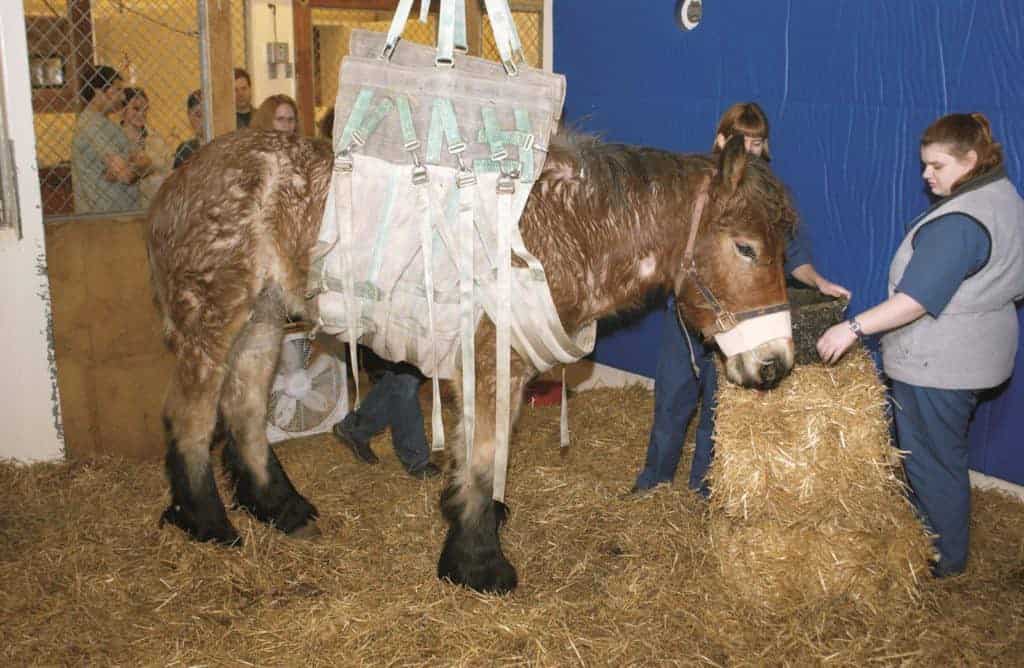A Prosthetic Eye for the Horse
Using ocular ultrasonography, he was able to diagnose complete retinal detachment with a large retinal tear. Because of the grave prognosis for recovery of vision, enucleation (removal of the eye) was recommended.
Horse-health-problem risk factors, prevention, diagnosis, and treatment
Using ocular ultrasonography, he was able to diagnose complete retinal detachment with a large retinal tear. Because of the grave prognosis for recovery of vision, enucleation (removal of the eye) was recommended.
My horse has recurrent colic and our veterinarian wants to treat her permanently with a low dose of prednisolone. Has this treatment been successful, and what side effects could be expected?
During colic surgery, it can be difficult to judge whether twisted bowel deprived of oxygenated blood, a process called ischemia, will recover sufficiently once it is replaced and blood flows again. While the bowel might look healthy on the outside,
Can horses eat oranges? I just bought a 4-year-old gelding who apparently loves oranges.
Rhodococcus equi is the most common cause of pneumonia in foals one to four months of age, bringing costly losses on affected breeding farms.
(Revised 12/5/03) Horse owners have a new option for treating equine protozoal myeloencephalitis (EPM) following the Nov. 19 U.S. Food and Drug Administration’s (FDA) approval of nitazoxanide. This medication has been under development

Botulism is not seen frequently in horses, but some areas are more prone to this deadly disease than others.
Strangles is a malady that has afflicted horses for hundreds of years. In fact, it was first described in a veterinary publication back in 1614. During the ensuing years, many horses have suffered from strangles. Most have recovered, but some have not. Along the way, the troublesome disease has cost the horse industry millions of dollars.
Crucell N.V., a Dutch biotechnology company, and the Israel-based Kimron Veterinary Institute are anticipating the approval of their veterinary West Nile Virus (WNV) in Israel in early 2004. Based on encouraging results from their early work,
The Rhode Island Department of Environmental Management has been notified of three suspected cases of encephalitis in horses in Rhode Island. All three horses are from Washington County and are being investigated for possible West Nile Virus
Allen’s Prospect, sire of 57 stakes winners and a hallmark of consistency, was euthanized Wednesday, Sept. 3, at age 21 following surgery at New Bolton Center in Pennsylvania for removal of a tumor under his jaw.
He had a fast-growing”P>Allen’s Prospect, s
Novartis Animal Vaccines announced Aug. 19 the conditional licensing and availability of the only antibody product approved by the USDA to help control disease caused by West Nile virus (WNV) in equids. This product helps an exposed animal by
The recent confirmation of Potomac horse fever (PHF) in an Oklahoma horse was possible because of relatively new–and inexpensive–testing techniques that help speed diagnose of the disease. This allows horse owners to be alerted
The first evidence of West Nile virus (WNV) in California this year was found in mosquitoes collected in Imperial County near the Salton Sea, announced Diana M. Bontá, RN, DrPH, state health director, on Aug. 20. Several flocks of
New Jersey officials announced last week that the state’s first equine case of Eastern equine encephalitis (EEE) since 2000 had been detected. The 8-year-old Thoroughbred in Mays Landing, Atlantic County, was euthanized Aug. 7.
Eastern”P>New J
The death of at least one Oklahoma horse has been definitively linked to Potomac horse fever (PHF), a disease rarely found in the state, and two of her stablemates likely died of the same illness. The horse manager at the farm with the confirmed
Stay on top of the most recent Horse Health news with
"*" indicates required fields